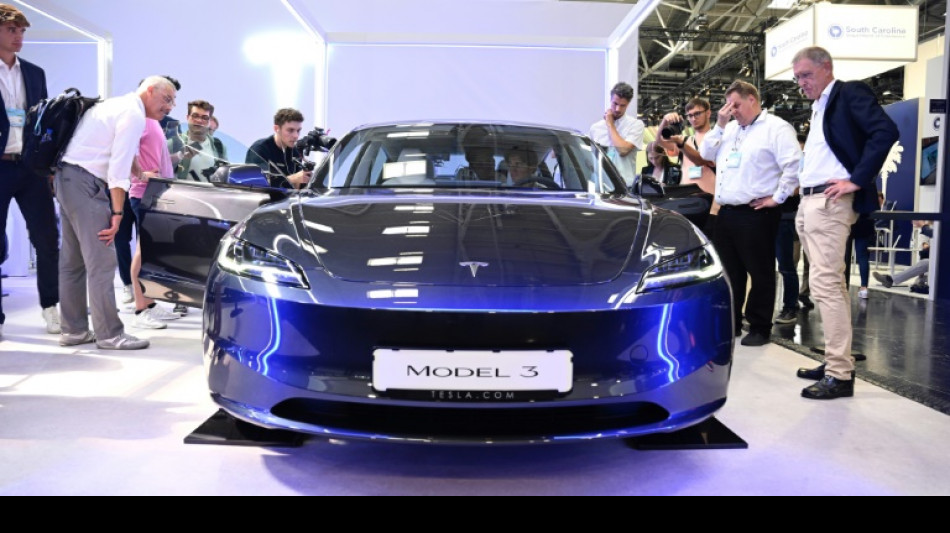

Tesla, Chinese brands take centre stage at Munich car show
Tesla and Chinese carmakers showed off their newest electric models at the Munich auto fair on Monday, throwing down the gauntlet to their European rivals as competition in the sector intensifies.
The industry-wide shift towards electric vehicles (EVs) was on full display on the opening day of Germany's biennial IAA mobility show, one of the world's largest.
Homegrown giant Mercedes-Benz unveiled its CLA concept, a family of all-electric cars with a range of more than 750 kilometres (466 miles), while BMW showcased its "Neue Klasse" (New Class) generation of battery-powered vehicles.
Renault debuted its new Scenic, the French group's first full-electric compact SUV.
But it was the non-European brands that promised to steal the limelight at this week's fair.
US electric car pioneer Tesla, owned by Elon Musk, returned to the IAA for the first time since 2013, sending visitors jostling for a glimpse of its revamped, mass-market Model 3.
Industry experts said Tesla's appearance in Munich was a sign it was taking the increased competition in the EV market seriously -- especially from China.
Having already captured a sizeable chunk of the prized Chinese market, Chinese manufacturers were out in force at the fair, hoping to win over European drivers with cheaper electric cars.
Chinese groups were starting "their assault on Europe with the IAA", said analyst Ferdinand Dudenhoeffer from the Center for Automotive Research in Germany.
In all, 41 percent of exhibitors at the fair have their headquarters in China, including brands such as BYD, Leapmotor and Geely.
- 'Crucial' Chinese market -
Chinese groups benefit from lower production costs, allowing them to offer cut-throat prices at a time when entry-level EVs are still a rarity.
Mercedes-Benz CEO Ola Kallenius said European firms had to stay competitive in the face of stiff competition.
"Don't make it worse. Don't start a debate that we should work less hours at the same pay, those types of things. That would be going the wrong direction," Kallenius told reporters at the IAA on Sunday.
Volkswagen CEO Oliver Blume predicted that Chinese competitors would struggle to keep their prices low in Europe, citing the costs of transport, customs and setting up distribution networks.
"The Chinese won't be able to offer the cost level they have in China in Europe either," he told reporters.
Volkswagen for its part would "continue to work hard" on cutting costs, Blume said, adding that the group's EVs were expected to reach the same price level as its combustion engines in the second half of the decade.
Blume acknowledged that it was "crucial" for VW to succeed in China's domestic EV market -- where it is currently lagging far behind BYD and Tesla.
"The more electric cars we have, the more we can benefit from economies of scale," Blume said.
The historic transition to zero-emission driving comes at a challenging time for the continent's auto makers.
While the supply chain problems caused by the pandemic have eased, surging energy prices in the wake of Russia's war in Ukraine and a weaker global economy are weighing on manufacturers.
Although car sales in the EU have steadily improved over the last 12 months, they remain around 20 percent below their pre-pandemic levels as inflation and higher interest rates dampen appetites for new vehicles.
- Climate protests -
Some 700,000 visitors are expected to attend this week's IAA, with Chancellor Olaf Scholz touring the fair on Tuesday.
Climate groups have vowed to stage protests, including acts of "civil disobedience" aimed at disrupting the fair.
On Monday morning, Greenpeace activists submerged three cars in a small lake outside the convention centre.
"The car industry continues to rely on too many cars, that are too big and too heavy. It's sinking the planet with that business model," Greenpeace spokeswoman Marissa Reiserer told AFP.
A.Edwards--MC-UK




